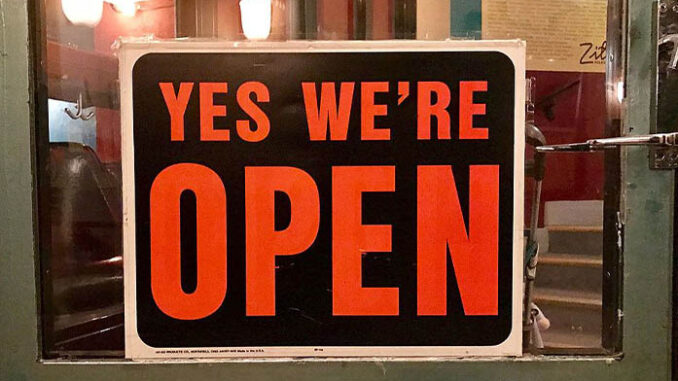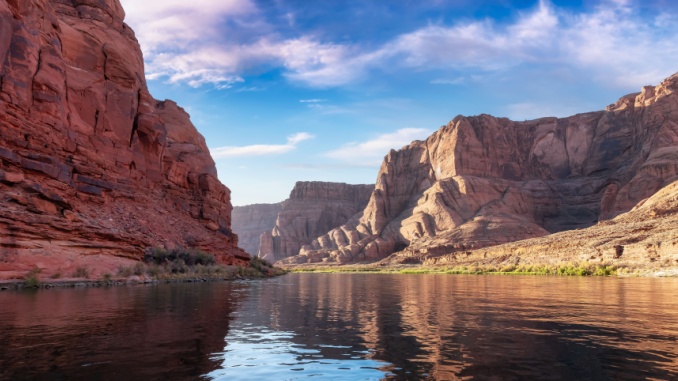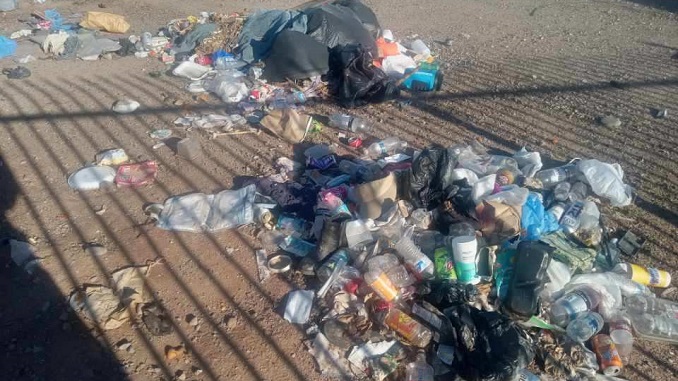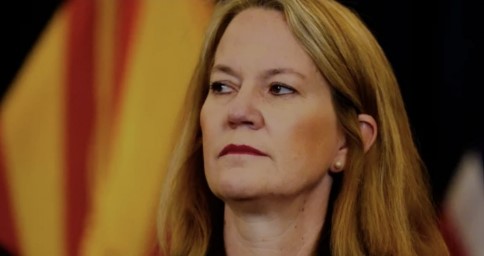
by Jonathan Eberle | Nov 15, 2025 | Education, News
By Jonathan Eberle |
Six Arizona campuses have been named Blue Ribbon Schools, a distinction announced Monday by State Superintendent of Public Instruction Tom Horne and the Arizona Department of Education, recognizing standout academic achievement and sustained student growth.
The schools earning the honor this year include the Academy of Math and Science in Peoria, Chinle Elementary School in Chinle, Empire High School in Tucson, the Maricopa Institute of Technology in Phoenix, Saint John Bosco Catholic School in Phoenix, and Ward Traditional Academy in Tempe.
Horne said the recognition reflects the department’s emphasis on academic rigor and measurable results.
“My primary focus as superintendent is on academic excellence, and these schools can be justifiably proud of this accomplishment because it is based on academic success,” Horne said. “Students and educators should always work toward continuous improvement in academic achievement, and Blue Ribbon Schools demonstrate that when schools lead students into challenging themselves, they will excel academically.”
The Blue Ribbon Schools program, now administered at the state level, highlights campuses that show strong performance on state assessments or demonstrate significant progress in closing achievement gaps among student groups. Established in 1982, the program is open to both public and private K–12 schools nationwide.
Arizona’s newly recognized schools will join a long-running tradition of campuses that exemplify high standards, strong instruction, and a commitment to raising student outcomes across diverse communities.
Jonathan Eberle is a reporter for AZ Free News. You can send him news tips using this link.

by Ethan Faverino | Nov 15, 2025 | Economy, News
By Ethan Faverino |
The NFIB Small Business Optimism Index declined 0.6 points in October to 98.2 points. Despite the small decline, it remains above its 52-year historical average of 98. In a positive sign, the Uncertainty index dropped 12 points to 88, marking the lowest level this year.
NFIB Chief Economist Bill Dunkelberg said, “Optimism among small businesses declined slightly in October as owners report lower sales and reduced profits. Additionally, many firms are still navigating a labor shortage and want to hire but are having difficulty doing so, with labor quality being the top issue for Main Street.”
Labor challenges persisted, with a seasonally adjusted 32% of owners reporting unfilled job openings, unchanged for the second straight month, and the lowest since December 2020.
Labor quality was cited by 27% of owners as their single most important problem, up 9 points from September and the highest since November 2021, when it reached 29%. It ranked 11 points above taxes, the second-largest concern. Of the 56% of owners hiring or trying to hire, 88% reported little to no qualified applicants.
Sales and profits declined, as a net negative 13% of owners reported higher nominal sales over the past three months, down 6 points. Positive profit trends fell 9 points to a net negative 25%—the largest contributor to the Index decline.
Among those with lower profits, 33% blamed weaker sales, 16% noted rising material costs, and 9% pointed to both labor costs and price changes.
Pricing pressures eased slightly, with the net percentage of owners raising average selling prices falling from 24% to 21%, though it is still above the historical monthly average of 13%.
30% of small businesses plan to raise prices in the next three months, just down 1 point. An unadjusted 31% reported higher prices, while just 12% reported lower prices.
Inventory gains dropped 3 points to a net negative of 6%. 10% reported stock increases while 15% reported reductions. Supply chain disruptions were cited as the biggest reason for inventory problems, with 60% of owners saying it affected them to some extent.
Capital investments saw 55% of owners reporting outlays in the past six months. Among them, 36% spent on new equipment, 22% on vehicles, and 14% on facility improvements or expansions. 23% plan outlays in the six months.
20% of small business owners expect better conditions, the lowest since April, but well above the historical average of 4%. Only 13% view it as a good time to expand. Business health assessments shifted, with 12% rating their business as excellent, 51% good, 33% fair, and 4% poor.
“A reduction in sales and profits has certainly taken a toll on small business owners’ optimism,” NFIB State Director Chad Heinrich said. “Despite these challenges and the ongoing labor shortage, our members are resilient, with many still trying to create good-paying jobs for Arizonans.”
Ethan Faverino is a reporter for AZ Free News. You can send him news tips using this link.

by Staff Reporter | Nov 14, 2025 | News
By Staff Reporter |
Rep. Adelita Grijalva opted not to address accusations that Democrats blocked an immediate, full release of the Epstein files on Wednesday.
A reporter questioned Grijalva during the Congressional Hispanic Caucus press conference about the Democratic inaction on a resolution to release the files in full that day.
Grijalva opted not to answer and instead stepped back to allow Rep. Pete Aguilar to speak on her behalf. Aguilar insisted Republicans were trying to prevent the release of the files.
“I think it’s incredibly clear that Republicans will stop at nothing to avoid the disclosure of this information,” said Aguilar.
Upon Grijalva’s swearing in on Wednesday, hers was the final signature needed on a petition to force a House vote on their full release. However, House Democrats rejected an attempt at a full release that same day.
Rep. Tim Burchett, a Republican, moved for unanimous consent of a resolution (HR 4405) to release all of the Epstein files immediately. House Democrats objected.
“We Republicans are requesting this unanimous consent. Are Democrats objecting to this request?” asked Burchett.
“Chair reminds the gentleman from Tennessee that as indicated by Section 956 the House Rules and Manual: it is not a proper parliamentary inquiry to ask the chair to indicate which side of the aisle has failed under the speaker’s guidelines to clear a unanimous consent request,” responded the speaker pro tempore.
Burchett said this was a strategic move to control the narrative on the Epstein files: by not authorizing a release all at once, a narrative could be better crafted.
“This is all gamesmanship folks. It’s not about releasing the files. They had something on Trump, they would’ve released it five and half or four years [ago]. And they hate Trump more than anything in the world,” said Burchett. “So they can piecemeal the truth and the half-truths, both sides, of what really went down with Epstein.”
Grijalva declined to address this inaction by her colleagues; however, she had much to say about House Speaker Mike Johnson.
The freshman congresswoman claimed Johnson’s delay in swearing her in had little to do with the government shutdown and everything to do with him being “misogynistic” and her being “a woman of color.” Grijalva framed the government delay as a great effort to prevent her swearing in.
“If I were a Republican, I would not have waited this long. If I were a man, I would not have waited this long. We all know that the rules are always different for women of color and people of color and we have to fight against that,” said Grijalva. “People in our community know what it’s like to depend on a Grijalva.”
Grijalva pledged to advance legislation to ensure the swearing-in delay that she encountered wouldn’t occur in the future.
A vote on the full release of the Epstein files is anticipated to occur sometime next week.
On Wednesday, House Republican leadership did release an additional trove of the Epstein files. The House Committee on Oversight and Government Reform released an additional 20,000 pages of documents.
As part of their publicization of the documents, Democrats redacted some of the material in the newly released trove.
Members of the media and public questioned the Democrats’ redactions, which included the hiding of a victim’s name in connection to an allegation against President Donald Trump.
The House Committee on Oversight and Government Reform responded to the sensationalized redaction that the mystery victim in question was Virginia Giuffre: a known advocate of Trump’s innocence in relation to Epstein.
“[T]his victim, Virginia Giuffre, publicly said that she never witnessed wrongdoing by President Trump,” stated the committee. “Democrats are trying to create a fake narrative to slander President Trump.”
Along with progress on the Epstein files, Congress also voted to end the government shutdown on Wednesday.
The shutdown lasted 43 days, the longest-running one in the nation’s history. Six House Democrats joined Republicans to vote for an end to the shutdown, 222 to 209. The Senate voted to end the shutdown on Monday.
President Donald Trump signed the spending bill into law on Wednesday night, officially ending the shutdown.
Arizona’s elected officials were divided along party lines across both chambers in their votes on ending the government shutdown. Democrats voted against it, Republicans voted for it.
The Democratic votes came from Reps. Henry Cuellar (Texas), Donald Davis (North Carolina), Jared Golden (Massachusetts), Adam Gray (California), Marie Gluesenkamp Perez (Washington), and Thomas Suozzi (New York).
AZ Free News is your #1 source for Arizona news and politics. You can send us news tips using this link.

by Matthew Holloway | Nov 14, 2025 | News
By Matthew Holloway |
Arizona’s top elected leaders — Democrats and Republicans alike — have joined forces to demand federal action after the seven Colorado River Basin states missed a critical deadline to finalize post-2026 water-sharing rules. In a letter to Interior Secretary Doug Burgum, they warned that refusal by upper basin states to commit to verifiable conservation has pushed the negotiations to a breaking point.
The letter, dated November 11, 2025, highlights Arizona’s role as a leader in water conservation and criticizes upper basin states for refusing to commit to verifiable reductions, which the signatories say have stalled a seven-state agreement needed to sustain the river amid ongoing droughts.
The seven Colorado River Basin states—four in the upper basin (Colorado, Utah, Wyoming, New Mexico) and three in the lower basin (Arizona, California, Nevada)—missed a federal deadline on November 11th to submit a consensus plan for sharing water shortages after 2026, when current operating guidelines expire. Federal officials, including the Bureau of Reclamation, have urged the states to reach an accord to avoid potential court intervention or unilateral action by the Trump administration.
In the letter, the Arizona leaders commended Burgum’s efforts over the past year to develop a framework preserving the century-old 1922 Colorado River Compact, which allocates water among the states. They emphasized the river’s critical role in fueling Arizona’s advanced technology ecosystem, world-class agriculture, military bases, and communities home to millions, including 22 of the basin’s 30 Native American tribes.
“Arizona’s cutting-edge semiconductor industries and IT infrastructure are making it possible for the onshoring of manufacturing operations that are critical for maintaining American technological leadership,” the letter states. It notes that Yuma County, one of the world’s most sophisticated agricultural regions, produces over 90% of the winter leafy greens supplied to the United States and Canada each year.
The signatories stressed that Arizona’s allocation is vital not only to the state’s citizens but to national economic growth and independence. They warned that the upper basin states’ refusal to offer “meaningful, verifiable conservation commitments” over the last two years risks these foundations of growth.
Arizona has positioned itself as a basin-wide leader in water efficiency, the letter asserts, partnering with California and Nevada to propose creative and significant post-2026 operating criteria. Under most scenarios, Arizona’s plans would conserve 1.5 million acre-feet of water per year, representing more than 27% of the state’s entitlement in most years. This follows more than 3 million acre-feet in efficiencies already offered by the lower basin states since 2023 to stabilize Lakes Mead and Powell.
In contrast, the letter points out that upper basin states have repeatedly refused to implement any volume of binding, verifiable upper basin reductions. “This extreme negotiating posture—four of the seven Basin States refusing to participate in any sharing of water shortages—has led to a fundamental impasse that is preventing successful development of a 7-State consensus plan for management of the Colorado River,” it reads.
The group urged Burgum to use his authority to ensure that any alternative considered by the Department of the Interior “contains measurable and enforceable conservation requirements” for the upper basin, guaranteeing the resource remains available for Arizona’s contributions to the economy and national security.
Signatories to the letter include Governor Katie Hobbs (D), Senate President Warren Petersen (R-LD14), House Speaker Steve Montenegro (R-LD29), Senate Democratic Leader Priya Sundareshan (D-LD18), and House Democratic Leader Oscar De Los Santos (D-LD11).
A joint statement from the seven states and federal officials acknowledged the missed deadline. Still, it affirmed a shared recognition of the basin’s challenges, with negotiators committing to continuing talks despite the setback. Lake Mead’s surface elevation stood at 1,057 feet as of recent measurements, with commenters noting that’s just 37 feet above levels that could trigger a “devastating” crisis for Arizona, including potential mandatory cuts to urban and agricultural users.
The full text of the letter is available here.
Matthew Holloway is a senior reporter for AZ Free News. Follow him on X for his latest stories, or email tips to Matthew@azfreenews.com.

by Matthew Holloway | Nov 14, 2025 | News
By Matthew Holloway |
The Arizona Supreme Court recently declined to review an Appeals Court ruling holding the City of Tucson liable for a public nuisance caused by homeless encampments, siding with three property owners who suffered property damage and financial losses. The Goldwater Institute highlighted this case as “welcome news for all Arizonans,” following the adoption of voter-approved Proposition 312.
The case, Bradford v. City of Tucson, comes on the heels of a similar court ruling against the City of Phoenix over its “Zone” encampment and is now being highlighted by the Goldwater Institute alongside voter-approved Proposition 312—a 2024 measure that lets property owners seek refunds when cities decline to enforce basic public nuisance laws.
Filed on behalf of three Tucson residents, the lawsuit sought injunctive relief against the City of Tucson, after homeless encampments near their homes and businesses in the Navajo Wash developed with makeshift toilets, dangerous fires, and individuals engaging in violent and criminal behavior.
The appellate court, reversing a trial court ruling against the residents, found that the “record is replete with testimony of specific incidents which proved that camping in the Navajo Wash has caused unsanitary and indecent conditions that invade the rights of the neighboring residents and business owners,” and demonstrated that Tucson was not shielded from liability “because the City knew the activity of homeless camping in this location was being carried on and that it repeatedly and continually caused a nuisance, yet consented to it anyway.”
Prop 312 now gives property owners a reimbursement tool in situations like those described in Bradford v. Tucson, allowing Arizonans to seek relief when a municipality “follows a policy, pattern, or practice of declining to enforce existing nuisance laws prohibiting illegal camping, obstructing public thoroughfares, loitering, panhandling, public urination or defecation, public consumption of alcoholic beverages, or possession or use of illegal substances, or maintains a public nuisance,” according to the Goldwater Institute’s explanation of Prop 312 claims.
Reimbursements are capped at the amount of property taxes paid the prior year, with any excess eligible for reapplication later.
Goldwater explained the law’s necessity on its website:
“Rampant homelessness is overtaking Arizona’s cities, as municipalities refuse to enforce laws against public camping, loitering, intoxication, and other nuisances. The result has been a rise in violent crime, biohazardous pollution, property destruction, and even death. Residents and business owners have had to take matters into their own hands, installing fences, hiring security, and cleaning up garbage, human waste, and other hazardous materials themselves—services the city is supposed to provide with the tax money these residents pay every year.”
Under Prop 312, once the Department of Revenue notifies a municipality of a claim, the city has 30 days to accept or reject it. If rejected, property owners may challenge the decision in superior court; if the city does not respond in time, the refund is deemed approved. Goldwater has offered to assist residents, saying, “If you believe your claim was improperly denied and you would like legal assistance, please contact us! Our lawyers may be able to help you.”
Claims are filed through the Department of Revenue’s online portal at prop312reimbursement.aztaxes.gov, which requires proof of property ownership, tax payment, and mitigation costs. The department notifies cities and issues approved reimbursements by check.
The decision represents a major blow to a large Arizona city’s assertion of immunity and underscores growing frustration with Tucson’s approach to homelessness amid public safety concerns.
In an op-ed Monday, Timothy Sandefur, Goldwater’s vice president for legal affairs, urged city leaders to act:
“Homelessness is a tragic and frustrating issue. But policies that leave people living on the streets aren’t the answer. Instead, they only create a new set of victims: the innocent taxpayers who must pay for police protection that they don’t receive. The time has come for city officials to shoulder their responsibilities—instead of forcing homeowners to shoulder the costs.”
Sandefur also warned that property owners in other states lack similar protections, citing Utah, and encouraged lawmakers elsewhere to “follow Arizona’s lead” by adopting Goldwater’s proposed Safe Neighborhoods Act.
Correction Notice: A previous version of this story incorrectly linked the Bradford v. Tucson case to the Goldwater Institute and cited an unrelated ruling.
Matthew Holloway is a senior reporter for AZ Free News. Follow him on X for his latest stories, or email tips to Matthew@azfreenews.com.

by Staff Reporter | Nov 13, 2025 | News
By Staff Reporter |
A recent whistleblower filing alleges Attorney General Kris Mayes was paid to prosecute President Donald Trump’s supporters.
According to the whistleblower, Christina Bobb — one of the indicted former Trump lawyers and current senior elections counsel for the Republican National Committee — Mayes inadvertently disclosed in filings her receipt of $200,000 from a Democratic Party offshoot founded in the 2020 election cycle for the purpose of defeating Trump and his allies.
The funds came from States United Democracy Center (SUDC), which the complaint alleged was payment to grant the organization prosecutorial influence over Mayes’ case against Trump’s 2020 attorneys, allies, and electors. The payment came in two allotments: $50,000 and $150,000.
“Prosecutors claim on the record and in emails that States United represents their office,” stated the complaint.
SUDC delivered a document to Mayes in the summer of 2023 proposing the charges to be brought against Trump’s foremost 2020 supporters. Mayes’ chief deputy attorney general, Dan Barr, told Capitol Media Services last December that the SUDC document “did not have a significant, if much, impact at all” in their case against the Trump 2020 electors.
Consistent with Mayes’ ongoing resistance to disclose further details of their working relationship with SUDC as related to the prosecution of Trump supporters, Barr declined to “get into the inner workings” of their relationship with SUDC.
Two key participants within SUDC involvement in Mayes’ prosecution have a history of high-profile actions taken to undermine Trump.
SUDC founder Norm Eisen was co-counsel for the House Judiciary Committee during the first impeachment of Trump in 2020.
The attorney on SUDC filings, Marc Elias, was counsel for former presidential candidate Hillary Clinton’s campaign. Elias also coordinated the Steele dossier that would serve as the basis for the falsified allegations of Russia interference in the 2016 election. In recent years, Elias has been the left-leaning legal bully stick ensuring the success of Democrat-led election reforms and demise of Republican-led election reforms.
The whistleblower complaint also questioned whether Mayes would receive a third payment upon a successful conviction.
Bobbs’ complaint was filed alongside a motion to disqualify Mayes and SUDC from continuing prosecution.
The motion came shortly after a Maricopa County Superior Court remanded Mayes’ case back to the grand jury for violating due process.
In September, several months after this motion was filed, Mayes lost her bid to continue prosecution with the court of appeals.
Mayes not only has these recent court outcomes stacked against her case — she has federal pressures as well.
Last Friday, President Donald Trump pardoned his key 2020 supporters through a proclamation — including those whom Mayes seeks to prosecute.
“This proclamation ends a grave national injustice perpetrated upon the American people following the 2020 Presidential Election and continues the process of national reconciliation,” stated Trump.
Pinal County Attorney Brad Miller responded to the pardons with the prediction that Mayes would drop the case, saying she had “no choice” in a Tuesday interview with The Gateway Pundit.
AZ Free News is your #1 source for Arizona news and politics. You can send us news tips using this link.






